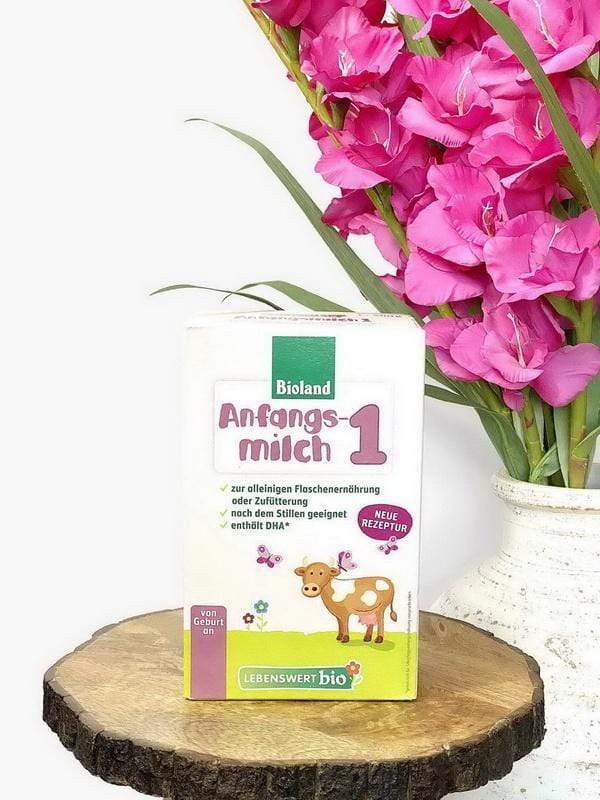It is finally time to wean your baby off formula! But how? In this simple guide, we will discuss all you need to know during this new transitioning period.
We know it can be daunting, especially when your child has learned to love formulas. Additionally, the worry about replacing nutrition can be troublesome.
When should babies stop drinking formula? Too young or too old can be problematic.
We are here to help! We will answer all these burning questions and more in the guide below.
Weaning Baby Off Formula
As formula is usually served from a bottle, weaning from formula is the next step in child development. While many parents may argue that children should quit the bottle at their own rate—doctors disagree. It is important for your baby to wean drinking from a bottle after turning 1 year old. Here is why:
- At 2 years old, your toddler should be drinking from a cup.
- The longer you wait, the harder it will be for you and your baby to switch.
- Bottle-feeding promotes cavities, because of the natural sugars found in lactose. If your baby uses a bottle too long, they will develop excess sugar in their teeth. If you must feed your toddler formula for health reasons, do so in a sippy cup - even if you still prepare it in the bottle, you can always pour it into the cup.
- An average two-year old should be eating healthy solids. Toddlers still on formula-only diets will not receive as many nutrients during mealtime.
When to Stop Feeding Formula
What age do babies stop drinking formula?
The best way to determine when to start weaning off formula is by speaking to your pediatrician. With the most knowledge of your baby and their personal health concerns, they will be the best to decide.
Most babies stop formula after 12 months. Some parents prefer the cold turkey method and others will gradually switch over throughout the month following their baby's first birthday. Both methods are effective, but it depends on which route you would like to take.
You can prepare your baby for the transition by slowly introducing a sippy cup, as early as 6 months. There are many different styles, and even some that look like bottles to really help them smoothly switch.
Additionally, your baby should be able to eat solids. But when are babies ready for solid food? Here are some signs to look for:
- Sitting up straight
- Good head control
- Can hold food in their mouth
- Willing to chew foods
- Can pick up food and put it in their mouth
- Curious at mealtime
Regardless of how you introduce the different cups or how you switch to milk, most parents take their baby off formula at 1 year of age, unless their doctor prescribes otherwise.
How to Transition Baby to Whole Milk
What to replace baby formula with is the next big concern parents face.
You can replace formula with whole cow’s milk at 1 year of age. This will provide all the essential nutrients.
The American Academy of Pediatrics (AAP), recommends an 8-12 oz serving of a calcium and vitamin D rich substance. We personally love the organic whole milk we find on the shelves, store brand or name brand doesn't matter, as long as they are organic.
Never use fat-free or reduced fat milks! Fat is vital for healthy growth and development in children.
It is important to note that at 2 years of age they can drink 2% milk, and at age 5 they can drink fat-free milk.
Additionally, be sure to give them plenty of filtered water. At this stage, milk should not be the primary drinking source, as they will retrieve nutrients from meals.
Special Needs
If you notice a milk allergy or milk intolerance—seek your pediatrician immediately. They will assess the situation to identify the allergy.
Most pediatricians will suggest using a hypoallergic formula, goats’ milk formula, or straight goat's milk from the local grocer's shelves if available.
Additionally, you can opt from using milk completely if you give them the daily recommended vitamins through another healthy source.
How to Wean Baby Off Bottle at Night
If your baby relies on the bottle for a night time comfort, this can be tricky. The big questions are…
When to stop giving baby a bottle before bed?
Simply put, you will need to slowly wean your child off the bottle.
How do you get your baby to stop drinking milk at night?
The only difference with this struggle is you will need to replace the bottle with another comfort. Try singing to them, toys, and loving on them. Generally, within time you will be able to wean off formula.
How to Transition Baby from Formula to Milk
Now that we know the basics, let us dive into 7 tips to get your baby off formula in a flash!
1. One Size DOESN’T Fit All
When switching your baby to whole milk instead of formula—focus on how much you are feeding them.
Overfeeding your baby can lead to discomfort, obesity, and digestive issues. Additionally, underfeeding them can cause even worse problems.
Ask your doctor how much you should feed your child, according to their weight and health.
2. Slowly Wean
As we previously mentioned, there are two types of weaning methods. Cold turkey and the slow and steady method.
We highly recommend choosing the slow and steady method. This will make adjustment easier for both you and your baby. Though you might need to muster up the patience, the results will be worth it.
How to do the Slow Method:
Begin to introduce solid foods and whole milk occasionally into your babies’ diet, beginning at 6 months old. You can try mixing whole milk into cereals or try a small amount of whole milk separately.
Additionally, solids can be fed now and then as a snack. Whole milk cheese and yogurts are a great way to help your baby learn to love the tastes of whole milk!
Be mindful to how much you are feeding your baby. Always ask for your doctor’s nutritional advice.
3. When can baby use sippy cup?
By as young as 6 months old, you can begin to wean your baby to a sippy cup. Though, most parents wait until their child is 1 year of age.
Typically, 1 year of age is the best time to start the process.
Any longer than 1 year of age can cause harm.
For example, the use of a bottle can cause cavities, as the sugar in lactose builds up on teeth.
You would not want your child on a bottle their entire life! So, they must switch sooner or later to a sippy cup. The sooner the better, as babies can become attached to their bottle quickly.
Your baby might cry, whine, and be upset—but know it will be for their own good.
The simple approach to switching to a sippy cup is to:
- Slowly introduce the sippy cup. Let them hold it with liquid, let them examine the cup.
- Feed occasionally with the sippy cup, slowly introducing it more and more into mealtime.
- Finally, remove the bottle completely from your baby’s diet. Only provide them with a sippy cup for liquids.
Within no time your baby will love their sippy cup! Just be patient and never give up.
4. Begin to Feed Solid Foods
As you begin to feed your baby wholesome formula alternatives, you will need to introduce solids if you have not already.
Without formula, they will need to receive nutrients from other healthy sources.
Like the sippy cup method, you will slowly need to wean your baby to love solids. Try naturally sweet foods, such as mushy fruits and veggies. Healthy baby cereals and foods are another convenient option for mothers on the go.
Here are some first taste staples:
- Soft cooked veggies. (Broccoli, carrots, sweet potatoes, squash, pumpkin, peas, etc.)
- Soft fruits (bananas, blueberries, raspberries, avocado, plums, peaches, mango, etc.) These are best served pureed or mashed.
- Cereals (oatmeal, quinoa, rice, millet, etc.) Serve cooked, mashed, or pureed. You can use whole milk, formula, or breastmilk with these cereals.
If you need help with ideas, check out these baby food recipes from the picky eater - she has plenty of recipes for as they grow into toddlers as well!
Within no time, your baby will be enjoying all the meals you prepare them!
5. Feed Nutritious Foods and Ones they will Love
Now that your baby is ready for solids, it is important to know what they can and cannot eat.
Certain foods are essential, while others can destroy their health.
Here is a quick guide of the foods!
Safe Solids:
Meats: If they are soft and easy to chew. Remove all bones.
Eggs: Cooked and mashed are safe for your baby.
Full fat dairy products: You can feed your baby milk, cheese, and yogurt. Never feed your baby fat-free milk.
Legumes: Beans, lentils, and peas are excellent protein sources for your infant.
Finger foods: Breads, cooked pasta, and rice cakes are great options to teach your baby to pick up their food.
Fruits: Soft, mashed fruits make a perfect snack. (Bananas, pears, mangos, avocados, etc.)
Vegetables: Softly cooked vegetables will provide your baby will the nutrients needed to grow up healthy. (Carrots, sweet potatoes, broccoli, etc.)
Nuts and seeds: Only feed your baby nut butters or finely ground nuts. Never feed your child whole nuts if they are under 5 years of age. Be careful to food allergies as well. Watch your baby closely to ensure they are not experiencing an allergic reaction.
Foods to Avoid:
Honey: A common but possibly fatal mistake parents make is feeding their child honey. Never feed a baby under the age of 12 months honey as it can cause botulism, a serious food poisoning.
Undercooked meat and eggs: Never feed your child something undercooked. These could contain Salmonella, which can make your child terribly ill.
Unpasteurized dairy: The pasteurization process kills harmful bacteria. Feeding your child unpasteurized dairy products can lead to an infection.
Sugary, salty, and processed foods: These can damage your baby’s health and wellbeing. Additionally, they can preset diabetes, heart disease, and childhood obesity.
Excessive sugar can also damage teeth and lead to cavities. Furthermore, too much salt can hurt babies’ sensitive kidneys.
Stick to healthy, wholesome meals to provide your baby with the safest nourishment.
Whole nuts: These are commonly known to cause infants to choke. Never feed a child under 5 years of age whole nuts. Be alert to potential allergies as well.
Low-fat foods: Babies need more fat than adults to grow. Do not skimp on this important macro.
How Often do you Feed them?
Starting at 7-9 months, many infants can begin to have 3 small meals per day. Choose foods that contain a balanced source of protein, carbs, and fats.
At 9-11 months of age, babies can eat approved family meals if cut into small bites or mashed. As they reach the 1-year mark, they should be able to eat harder finger foods, such as apples and crackers. This age is the prime time for 3 meals a day.
At the 1-year mark, babies can eat three small meals, along with 2-3 snacks. Every baby is unique and has special needs, so feed your baby depending on their needs.
6. Be Emotionally There for Them
During stressful times, both you and your baby may forget to take it easy. Your baby is still readjusting to a new lifestyle change. So, remember to comfort them when they cry or get upset.
Here are some tips for calming your baby during mealtimes.
-Swaddle, cradle, or bounce your baby to make them feel secure.
- Hold your baby and place their body on their left side to sooth digestion. Rubbing your child’s back is also another sweet gesture.
-Burp your baby! Many can forget this step, but burping may solve the crying instantly. Be gentle and pat them on the back to relieve them from troubling gas.
-Avoid overfeeding. This could make them uncomfortable so be sure to wait 2 hours before each feeding.
-Make your baby laugh by playing with them. Try stroking their hair or playing calming music. Do what you know your baby loves the most. All children are different after all, so tailor to your little one’s needs.
7. Be Alert to Prevent Choking
The big worry that has parents afraid of solids is the risk of choking. It is important to know gagging is a normal process when babies learn to eat. It is a safety mechanism to prevent from real choking.
Signs of gagging: opening of the mouth, thrusting tongue forward, coughing, or spluttering. There is nothing to be afraid of when this happens.
Choking on the other hand is serious, as it blocks air from reaching your babies lungs.
Signs of choking include turning blue, silence, and not being able to make noise.
Here are a couple of tips to prevent choking:
-Sit your baby upright in a good posture while eating.
-Never leave your baby alone while eating.
-Avoid risky foods such as nuts, grapes, popcorn, blueberries, and meat that could contain bones.
-Do not give too much food at once. Small spoonful at a time only. Never force-feed your child.
In case your child chokes, you should always be prepared. Taking a first-aid course can be helpful for parents wanting the upper hand. Here is a quick YouTube video to see these first aid steps in action.
Remember, if your baby is unable to cough up the food, call emergency services immediately.
Conclusion
All babies must wean off formula at some point. Some parents will decide to slowly-wean while others prefer cold turkey. Regardless, replacing formula with healthy, balanced meals is essential.
Remember to be patient with your child and try to prevent choking by following precautionary steps. We hope you and your baby have benefited from this guide!














